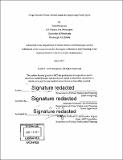Programmable places : mobile games for improving public space
Author(s)
Margeson, Scott (Scott Cedric)
DownloadFull printable version (12.01Mb)
Alternative title
Mobile games for improving public space
Other Contributors
Massachusetts Institute of Technology. Department of Urban Studies and Planning.
Advisor
Sarah Williams.
Terms of use
Metadata
Show full item recordAbstract
The public realm is an important element of any city. Urban design theorists like Allan Jacobs have described in detail how public spaces can serve city inhabitants with physical comfort and social amenities. Meanwhile, urban political theorists like Henri LeFebvre have pointed out that public space is a crucial platform for the establishment of a democratic and equitable public sphere. What happens to these functions when physical public space is overlaid by a virtual dimension accessible only through digital devices? The huge popularity of Pokemon Go, a mobile smartphone game released in 2016, shows how significantly an urban place can be changed by a digital game. At that time, a flood of news reports and anecdotes from the US and around the world described a sudden army of urban explorers filling previously underutilized parks and having serendipitous encounters with friends and strangers. This thesis explores in detail how the physical and political functions of urban public space were impacted by the release of Pokemon Go. This is important in order for urban planners and public officials to fully understand the positive and negative implications of virtual worlds that interact with the "real" world, and may be widespread in the future. Performing a survey of public-space-related behaviors and attitudes among Pokemon Go players, this research set out to test whether Pokemon Go helped to further the environmental and political functions of public space. The results show that Pokemon Go's effects vary considerably depending on the specific location and on the attitude of the individual. Nevertheless, it is shown that Pokemon Go's release caused significant positive and negative changes in peoples' use of public space, with a particularly pronounced effect on players. Furthermore, deliberate interventions using the game have the potential to make cities more equitable and their citizens more engaged.
Description
Thesis: M.C.P., Massachusetts Institute of Technology, Department of Urban Studies and Planning, 2017. Cataloged from PDF version of thesis. Includes bibliographical references (pages 56-58).
Date issued
2017Department
Massachusetts Institute of Technology. Department of Urban Studies and PlanningPublisher
Massachusetts Institute of Technology
Keywords
Urban Studies and Planning.